Related Research Articles
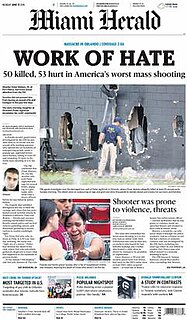
The Miami Herald is an American daily newspaper owned by the McClatchy Company and headquartered in Doral, Florida, a city in western Miami-Dade County and the Miami metropolitan area, several miles west of Downtown Miami. Founded in 1903, it is the fifth largest newspaper in Florida, serving Miami-Dade, Broward, and Monroe Counties. It once circulated throughout all of Florida, Latin America and the Caribbean. The Miami Herald has been awarded 22 Pulitzer Prizes since its 1903 founding.
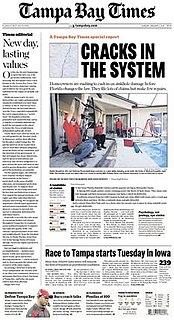
The Tampa Bay Times, previously named the St. Petersburg Times until 2011, is an American newspaper published in St. Petersburg, Florida, United States. It has won fourteen Pulitzer Prizes since 1964, and in 2009, won two in a single year for the first time in its history, one of which was for its PolitiFact project. It is published by the Times Publishing Company, which is owned by The Poynter Institute for Media Studies, a nonprofit journalism school directly adjacent to the University of South Florida St. Petersburg campus.

Connie Schultz is an American writer and journalist. Schultz is a nationally syndicated columnist for Creators Syndicate. She worked at The Cleveland Plain Dealer newspaper from 1993 to 2011. She won the 2005 Pulitzer Prize for Commentary for "her pungent columns that provided a voice for the underdog and underprivileged". She is married to Sherrod Brown, Democratic U.S. Senator from Ohio, and resigned from the paper to avoid a conflict of interest. She teaches journalism at Kent State University.

James Cash Penney Jr. was an American businessman and entrepreneur who founded the JCPenney stores in 1902.
The Missouri School of Journalism at the University of Missouri in Columbia is one of the oldest formal journalism schools in the world. The school provides academic education and practical training in all areas of journalism and strategic communication for undergraduate and graduate students across several media including television and radio broadcasting, newspapers, magazines, photography, and new media. The school also supports a robust advertising and public relations curriculum.
Jim Romenesko is an American journalist in Evanston, Illinois. His eponymous blog provides daily news, commentary, and insider information about journalism and media. Romenesko also ran the blog Starbucks Gossip, which covered the Starbucks company. He previously ran the blog Romenesko on the website of the non-profit journalism school the Poynter Institute.
Carol Sutton was an American journalist. She got her journalism degree from the University of Missouri. In 1974 she became the first female managing editor of a major U.S. daily newspaper, The Courier-Journal in Louisville, Kentucky. She was cited as the example of female achievement in journalism when Time named American Women as the 1975 People of the Year. During her tenure at the paper, it was awarded the 1971 Penney-Missouri Award for General Excellence and in 1976 the Pulitzer Prize for Feature Photography for its coverage of school desegregation in Louisville. She is also credited with significantly raising the number of minority reporters on staff.
Peter Mark Rinearson is an American journalist, author, entrepreneur and executive. He is a winner of the Pulitzer Prize and a former vice president of Microsoft. Much of his career has focused on enhancing tools for storytelling, from Microsoft Word to web publishing to social media.

Sewell Chan is an American journalist who is the editor-in-chief of The Texas Tribune. Prior to that he was the editorial page editor at the Los Angeles Times, where he oversaw the editorial board and the Op-Ed and Sunday Opinion pages of the newspaper. Chan worked at The New York Times from 2004 to 2018 in a variety of reporter and editorial positions.
Phyllis C. Richman is an American writer and former food critic for The Washington Post for 23 years, a role that led Newsweek magazine to name her "the most feared woman in Washington". Washingtonian magazine listed her as one of the 100 most powerful women in Washington.
Vivian Anderson Castleberry was an American newspaper editor, journalist, and women's rights activist, who was elected to the Texas Women's Hall of Fame in 1984.
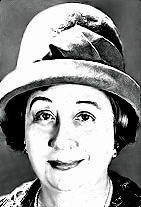
Marjorie Irene Evers "Marj" Heyduck (1913–1969) was a reporter, columnist and editor for the Dayton Herald, Dayton Press, Dayton Journal, Dayton Journal-Herald, and Dayton Daily News from 1936 to 1969. She also hosted a radio show from 1939 to 1941.
Marie Willard Anderson was a Miami, Florida newspaper editor. Under her leadership in the 1960s the Miami Herald Women's Page transformed into a nationally recognized progressive women's section, one of the first in the country to do so, and won the Penney-Missouri Award four times.
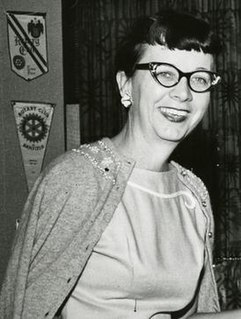
Dorothy Misener Jurney was an American journalist. As women's page editor for the Miami Herald, she shifted the focus of those pages from the "Four F's – family, food, fashion, and furnishings" – to focus on covering women's issues as hard news, and influenced other newspapers to follow suit. The National Press Club Foundation called her "the godmother of women's pages".

The women's page of a newspaper was a section devoted to covering news assumed to be of interest to women. Women's pages started out in the 19th century as society pages and eventually morphed into features sections in the 1970s. Although denigrated during much of that period, they had a significant impact on journalism and in their communities.
Henrietta Malkiel Poynter (1901–1968) was an American journalist and businesswoman credited as the co-founder of Congressional Quarterly with her husband, Nelson Poynter.
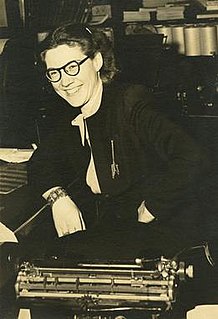
Marjorie Paxson was an American newspaper journalist, editor, and publisher during an era in American history when the women's liberation movement was setting milestones by tackling the barriers of discrimination in the media workplace. Paxson graduated from the University of Missouri School of Journalism in 1944, and began her newspaper career in Nebraska during World War II, covering hard news for wire services. In the 1960s, Paxson worked as assistant editor under Marie Anderson for the women's page of the Miami Herald which, in the 1950s, was considered one of the top women’s sections in the United States. From 1963 to 1967, she was president of Theta Sigma Phi, a sorority that evolved into the Association for Women in Communications (AWC). She won the organization's Lifetime Achievement Award and was inducted into its hall of fame. In 1969, she earned a Penney-Missouri award for her work as editor of the women's page in the St. Petersburg Times.
Tony Messenger is a Pulitzer Prize-winning columnist for the St. Louis Post-Dispatch.
Margo Huston is an American reporter. She won the 1977 Pulitzer Prize for Breaking News Reporting while working at the Milwaukee Journal Sentinel.
Ruth Ellen (Lovrien) Church was an American food and wine journalist and book author. She spent 38 years as the Chicago Tribune’s food editor and became the first person to write a wine column for a major U.S. paper in 1962, a decade before Frank Prial's column for the New York Times.
References
- ↑ Taft, William H (2015). Encyclopedia of Twentieth Century Journalists. Routledge. p. xiv. ISBN 9781317403258 . Retrieved 24 November 2018.
- ↑ Harp, Dustin (2007). Desperately Seeking Women Readers: U.S. Newspapers and the Construction of a Female Readership. Lexington Books. p. 32. ISBN 9780739114902.
- 1 2 Voss, Kimberly Wilmot (Spring 2006). "The Penney-Missouri Awards: Honoring the Best in Women's News". Journalism History. 32 (1): 43. doi:10.1080/00947679.2006.12062697. S2CID 140928882.
- 1 2 Voss, Kimberly Wilmot (Spring 2006). "The Penney-Missouri Awards: Honoring the Best in Women's News". Journalism History. 32 (1): 44. doi:10.1080/00947679.2006.12062697. S2CID 140928882.
- 1 2 3 4 Voss, Kimberly Wilmot (Spring 2006). "The Penney-Missouri Awards: Honoring the Best in Women's News". Journalism History. 32 (1): 46. doi:10.1080/00947679.2006.12062697. S2CID 140928882.
- ↑ Romenesko, Jim (19 August 2008). "Winners of Missouri Lifestyle Journalism Awards announced". Poynter. Retrieved 3 May 2021.
- ↑ "Missouri School of Journalism Announces 2008 Winners of the Missouri Lifestyle Journalism Awards" (Press release). Missouri School of Journalism. 19 August 2008.
- ↑ "Winners of 2007 Missouri Lifestyle Journalism Awards Announced" (Press release). Missouri School of Journalism. 22 May 2007. Retrieved 3 May 2021.
- ↑ "Missouri Lifestyle Journalism Awards: 2006 Winners and Finalists" (Press release). Missouri School of Journalism. 24 October 2006. Retrieved 3 May 2021.
- ↑ "Missouri Lifestyle Journalism Awards: 2005 Winners and Finalists" (Press release). Missouri School of Journalism. 20 June 2005. Retrieved 3 May 2021.
- 1 2 Romenesko, Jim (27 January 2009). "Missouri journalism contest director promises that winners will get their prizes". Poynter. Retrieved 3 May 2021.
- ↑ Romenesko, Jim (7 May 2009). "Missouri Lifestyle Journalism Award prize finally arrives". Poynter. Retrieved 3 May 2021.
- ↑ "Penney-Missouri Journalism Awards, Records, 1960-1993" (PDF). State Historical Society of Missouri. Retrieved 21 November 2018.
- ↑ Streitmatter, Rodger (Summer 1998). "Transforming the Women's Pages: Strategies that Worked" (PDF). Journalism History. 24 (2): 72–80. doi:10.1080/00947679.1998.12062493. Archived from the original (PDF) on 27 December 2018. Retrieved 26 December 2018.